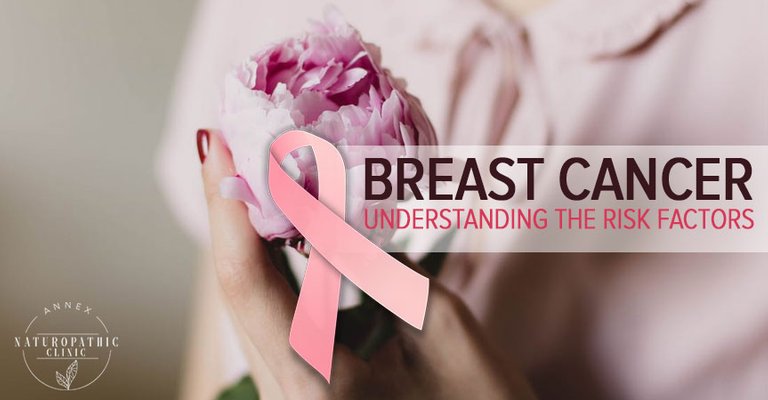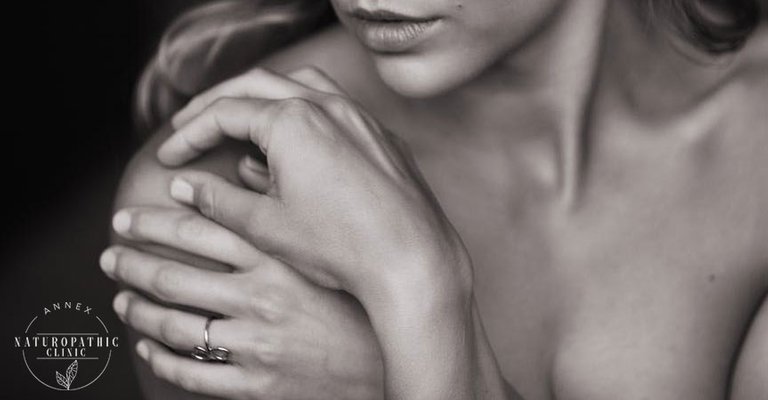
At our naturopathic clinic, one of our main areas of focus is naturopathy for women’s health.
We often see women or hear stories about others who have been affected by cancer in their live’s.
Today’s article’s goal is to provide further understanding around breast cancer, specifically risk factors and prevention, for both women and men.
Women and Breast Cancer
Breast cancer is the most common cancer diagnosis in women over the age of 20.
Research from the Canadian Cancer Society estimates that 1 in 8 Canadian Women will have breast cancer in their lifetime, and 1 in 31 will die from it.
Reducing risk and early detection are important factors in decreasing the amount of people affected by breast cancer.
Understanding the risk factors
There are 2 types of risk factors.
These factors are classified as those that are non-modifiable, such as age, family history, and genetics, and those that can be modified, such as physical activity or smoking.
Non-modifiable risk factors
Gender:
Breast cancer is significantly more common in Females.
Men with breast cancer make up fewer than 1% of all cases.
Age:
78% of new breast cancer diagnosis occur in women older than 50.
About half of all new cases of breast cancer occur in this age group.
Genetics:
BRCA1 and BRCA2 are tumor suppressor genes – they play a role in the body’s ability to stop cancer from happening.
5-10% of all breast cancers are linked to mutations in these genes.
BRCA1 and BRCA2 occur in less than 1% of the populations, however, women with these gene mutations have up to an 80% risk of developing breast cancer by age 802.
Personal or family history of breast cancer:
A woman with cancer in one breast has a 3- to 4-fold increased risk of developing a new cancer in the other breast or in another part of the same breast3.
Women who has first-degree relatives with a history of breast cancer has has an increased risk.
Someone with one first-degree relative with breast cancer approximately doubles a woman’s risk.
The more first-degree relatives (sister, mother, daughter) with breast cancer, the greater the risk.1
Menstrual History:
Women whose first period was at age 11 or younger and/or women who experience menopause after age 55 have an increased risk of breast cancer.
Those who have more menstrual cycles throughout her lifetime, have greater exposure to estrogen and its metabolites.
Similarly, women who have had one or more pregnancies, have a greater protection against breast cancer.
Pregnancy limits the exposure of breast cells to estrogen and lowers the total number of menstrual cycles a woman has in her lifetime.4
Breast Density:
Breast contain fatty tissue as well as dense tissue such as connective, gland and milk duct tissues.
Women with dense breast tissue in 75% or more of their breasts have a 4-5 fold greater risk of breast cancer.5
Modifiable Risk Factors
Body weight and physical activity:
Women who are overweight have an increased risk of developing breast cancer.
Breast cancer may be influenced by the amount of estrogen tissue in the breast is exposed to over time.
In addition to the ovaries, estrogen is also produced in fat tissue.
Therefore, higher body-weight due to excess fat tissue can increase estrogen levels.
Those who do not exercise also have an increased risk.
Alcohol and smoking:
Smoking increases overall cancer risk, including breast cancer.
Alcohol consumption increases a woman’s risk for breast cancer.
Even low levels of alcohol consumption (just over 1 drink per day) can increase a woman’s risk.
The risk increases with the amount of alcohol consumed.

New Research Surrounding Possible Risk Factors
Lack of exposure to sunlight and low vitamin D levels:
There are multiple recent studies that demonstrate that vitamin D deficiency significantly increases breast cancer risk.
While at the same time, another study showed that women with elevated risk, who had high serum 25(OH) vitamin D levels because of regular vitamin D supplementation were associated with lower rates of incident, especially in the postmenopausal population.6,7
Diet and Nutritional Status:
There is some evidence to show that high intakes of saturated fats and and high glycemic load (simple sugars and refined carbohydrates) increases risk.8
Exposure to “Xeno-estrogens”:
Xenoestrogens are man-made compounds that mimic estrogen’s effects.
Postmenopausal women with high serum levels of Bisphenol A (BPA) and mono-ethyl phthalate had elevated breast density. Elevated breast density is associated with increased risk.k.9
Prevention and Early Detection
Although people can’t change their genetics, age or whether or not they are born with ovaries- they can modify their lifestyle to reduce their breast cancer risk in other ways.
Leading a healthy lifestyle with appropriate diet and lifestyle, correcting for nutritional deficiencies (like vitamin D) and optimizing overall health will reduce the risk for breast cancer.
While at the same time, following Canada’s breast cancer screening guidelines and seeking medical attention if you notice any changes to your breasts can facilitate early detection and treatment.
Naturopathic doctors excel at helping their patients optimize their health and make the changes that reduce modifiable risk factors.
Through evidence-informed knowledge, and taking a preventative approach to healthcare we can help reduce the amount of women affected by breast cancer.
This article originally appeared on the blog of Annex Naturopathic. It appears here on Steemit with the full permission of the original source.
Hi! I am a robot. I just upvoted you! I found similar content that readers might be interested in:
https://www.breastcancer.org/risk/factors/family_history
@csmedia you were flagged by a worthless gang of trolls, so, I gave you an upvote to counteract it! Enjoy!!
Congratulations @csmedia! You have completed the following achievement on Steemit and have been rewarded with new badge(s) :
Click on the badge to view your Board of Honor.
If you no longer want to receive notifications, reply to this comment with the word
STOP